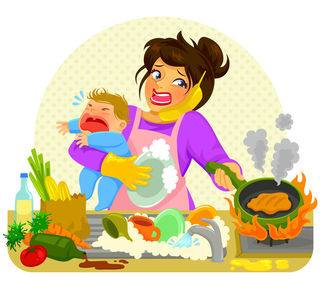Burnout
Self-Care or Self-Sabotage? When Self-Care... Isn't
Do you know the difference between self-maintenance and self-care?
Posted September 16, 2019 Reviewed by Abigail Fagan

Parents are finally willing to admit it: Parenting can burn us out. Not just balancing parenting and work obligations, not the mental load of managing a home, dinner menus, and soccer practice, and not the occasional temper tantrum. The act of parenting itself can cause burnout. Makes sense, right?
Occupational burnout occurs when the demands on the employee are greater than the employee’s capacity to handle them, when targets for success and failure are always shifting in unpredictable ways, and when the work is inadequately praised or compensated.
Doesn’t that sound like parenting? Kids will always need more than we can supply because no matter how much we supply, there’s an infinite world of things out there that we can supply more of. Targets for success shift all the time when we’re parenting.
Yesterday, your child loved that supper, today it’s “gross.” Yesterday, one activity was fine, today we’re all taking Baby Japanese and going to coding classes. Don’t get me started on Pinterest lunches and hairstyles! In terms of adequately compensated, sure, that sticky toddler hug goes a long way, but sometimes, when you’re Public Enemy #1 just for insisting on things like tooth brushing, or homework completion, it sure doesn’t feel that way. (To read more about parental burnout, click here.)
Burnout on the Neurological Level
Burnout is dangerous in a lot of ways. When we’re exhausted, we’re more reactive, quicker to snap, and quicker to use harsh punishment. Parents reporting high levels of burnout endorsed using harsher punishment or language than expected, dreaming of "escaping" from parenting entirely, and even being aggressive towards children.
Of course, when they’re all asleep, and look like little angels, guilt comes out in full force. Mothers tell me things like:
My mother used to slap us and call us hurtful names. I always said I wouldn’t do that, but there I was … yelling and I even lifted my hand to slap my son. I didn’t actually slap him, but how did I get there? It’s a place I never wanted to be.
And:
I was just so exhausted, and then she threw a temper tantrum about doing her homework. I started to cry. I told her, “You hate me. You just want to make my life harder.” How could I SAY that to an 8-year-old? But I was just so so so tired.
On a neurological level, this may be because burnout blocks attunement. Attunement is our ability to intuit what our children are thinking and resonate with their emotional state. A child who is resisting homework might be feeling anxious about her ability to complete it. When Mom is attuned, she can intuit that, and approach the homework differently. (For more about how burnout blocks attunement, click here. For more about predicting child behavior accurately, click here.)
Self-Care Is Child Care, But What Is Self-Care, Really?
When I ask mothers what self-care activities they engage in, I hear different things. Many tell me they’re too busy caring for their neurodivergent kids to really engage in self-care. Some talk about getting a good night’s sleep, eating healthy, or getting to the gym. Some say that zoning out in front of a mindless reality show while eating popcorn (until they fall asleep on the couch) is about as close as they get. (To read more about the Targeted Parenting approach, click here.)
Even the parents who talk about the gym, healthy eating, and good sleep are missing the boat. Self-care is none of those things. Those are all acts of self-maintenance. Sure, we all need to get enough sleep, to eat healthily, and to get to the gym. We also need to brush our teeth, get our vitamins, shower occasionally, and head to medical appointments. But those things aren’t self-care!
Self-maintenance is necessary but not sufficient for self-care. If that’s all you’re doing, you’re not engaging in self-care at all. After all, some of those self-maintenance activities can contribute to burnout. When we’re fighting through traffic to get to our favorite spin class, or we’re spending time cooking salmon and chopping kale, or we’re putting those things on our to-do list – that can just add to burnout. It’s important – we can’t sacrifice it – but it’s the bare minimum.
Self-Care vs. Self-Maintenance: The Crucial Difference
Self-care is the joy of recharging our tanks. It’s OK if our self-care isn’t what it “should” be. If a mom goes to yoga because she knows it’s healthy, but it doesn’t fill her with serenity, that’s OK. She just needs to pick another self-care experience. Maybe it’s a paint night, an evening with friends, or reading a book. Whatever it is, it needs to recharge that person’s batteries. If finger-painting with a 4-year-old is rewarding, but not an unmitigated joy experience – it’s fine to head out to the gym or the art studio or a concert – because that’s what self-care means.
Self-Care vs. Anesthesia
What about the “watch Netflix till I doze off on the couch” experience? That’s not self-care or self-maintenance. That’s anesthesia. Now, anesthesia is not a bad thing – in small doses. No one wants to go through surgery without it, right? Sometimes, we just have to numb ourselves from the day, and if that means eating candy and consuming our equivalent of brain candy – that’s OK. A truly rough day sometimes deserves a little anesthesia, but that can’t be the self-care plan on a regular basis.
Saying Goodbye to Mr. Guilt
When guilt strikes, telling us we can’t possibly sacrifice the time needed for self-maintenance and self-care, we have to banish it. I like to give uncomfortable emotions names – so that in my Targeted Parenting classes, we can all “welcome” Mr. Guilt, hear him out for a minute, and then promptly banish him. “Thanks for the information, Mr. Guilt. I know time is tight, but if I don’t get to the gym and to my night out with friends, my brain won’t be able to attune to my kids. You can go now!” Remember, self-care is childcare. Let's take care of ourselves, minus the guilt!
© Robyn Koslowitz, 2019
References
Freudenberger, H. (1974). Staff burn-out. J. Soc. Issues 30, 159–165.
Mikolajczak, M., Raes, M.-E., Avalosse, H., and Roskam, I. (2017). Exhausted parents: sociodemographic, child-related, parent-related, parenting and family-functioning correlates of parental burnout. J. Child Fam. Stud. 27, 602–614.
A. Azhari, W. Q. Leck, G. Gabrieli, A. Bizzego, P. Rigo, P. Setoh, M. H. Bornstein, G. Esposito. Parenting Stress Undermines Mother-Child Brain-to-Brain Synchrony: A Hyperscanning Study. Scientific Reports, 2019; 9
Moïra Mikolajczak, James J. Gross, Isabelle Roskam. Parental Burnout: What Is It, and Why Does It Matter? Clinical Psychological Science, 2019




